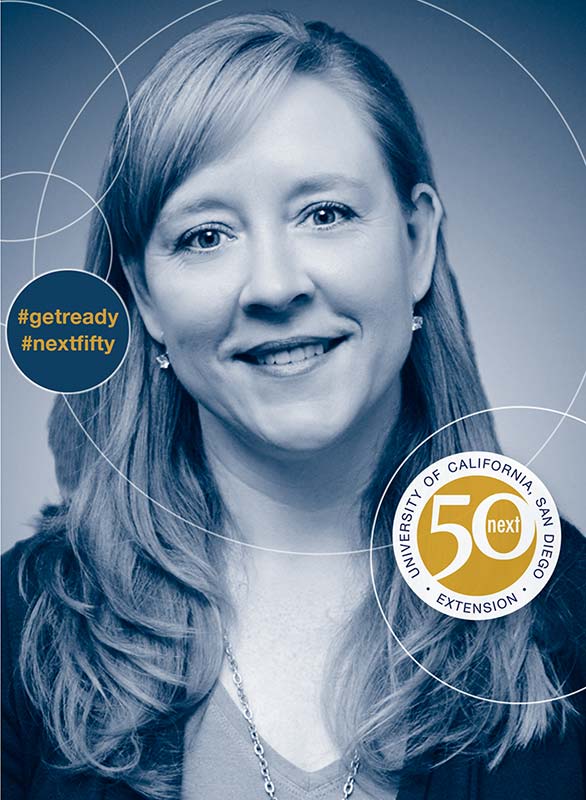
In honor of UC San Diego Extension's first 50 years, 50 Voices of the Future asks thought leaders about the trends, breakthroughs and social advances they foresee over the next 50 years.
Dr. Amy Jak doesn't just want us all to live to a ripe old age. Jak wants us to age well -- and that means having a healthy brain as well as a healthy body. Alzheimer's is the sixth leading cause of death in the United States, which is why Jak is devoted to helping reduce the risk and delay the onset of the disease through exercise and other cognitive workouts. Dr. Jak is neuropsychologist and an associate professor of Psychiatry at the UC San Diego School of Medicine.
(1) Why is the work you do important?
There really are so many scientists working on every front of Alzheimer's disease. But to date, things like medication trials haven't proved successful for Alzheimer's. Behavioral intervention - which is what I focus on - such as exercise and cognitively challenging activities, have shown promise in reducing that risk for developing Alzheimer's. Then really anything that reduces the risk for Alzheimer's or even delays the onset of the disease even by a year or two can lead to really large benefits to a person's quality of life and reduction in health care costs.
(2) What are the influential/exciting developments happening in your field now and why?
I've been hearing this phrase that "sitting is the new smoking." To me, the development in understanding the detriments of sedentary behavior, not only to your physical health, but to cognitive health, have really exploded. I think the research and then subsequent awareness and education that will emerge from all of that will be tremendously beneficial to people's cognitive health as they get older. I think that's very exciting.
(3) What's the next big thing?
I think the next big thing is personalized or precision medicine. The idea that if we had a better understanding of someone's genetics or specific biomarkers for things like Alzheimer's disease or poor cognitive aging that we could identify in individuals, that it would actually lead to improved diagnosis, improved treatment, and allowing us to specifically target interventions to one person's specific presentation, genetics, and where we think the etiology of those symptoms came from.
(4) How big of an impact will your field play in shaping the future of the San Diego region and beyond?
I think that we're really fortunate to have a very large and healthy neuroscience and neuropsychology research community in San Diego. We have, and I think continually will, play a major role in the future of Alzheimer's research, particularly assessment, prevention, treatment. There are lots of entities in our area particularly - my colleagues in the department of psychiatry, our Alzheimer's Disease Research Center at UC San Diego, the local as well the national Alzheimer's Association - that really are on the leading edge of science in this area. Having that locally is a real boon to the folks in San Diego. But I think the influence of the research done here also spreads nationally and well beyond our region.
(5) Hop into your time machine...what does the future look like for this field in 50 years? How can individuals/companies get prepared for what's next?
We all want to get older but we all want to get older and be healthy. That includes both physical and cognitive health. All the work that's taking place in things like behavioral health and the focus on the whole person will contribute, not just to people simply living longer, but actually living a better, higher quality of life. Improving aging outcomes in general and then with all this focus on aging and aging well - and then particularly the intense work regarding dementia specifically - I am really hopeful that we might start to see the beginning of a world without Alzheimer's disease.
Explore the Osher Lifelong Learning Institute courses and programs, as well as tuning into UCSD-TV for cutting edge research about Alzheimer's discoveries and prevention.